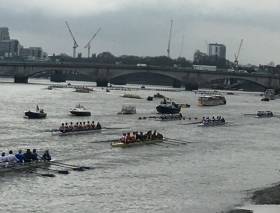Displaying items by tag: Schools Head
#Rowing: Enniskillen RBC had two outstanding results at the Schools’ Head of the River in London. The girls’ eight won their category, the First Eights, and were fifth overall. The boys’ eight finished second in the equivalent category behind Bedford. When the revised results were published this placed them 10th overall, the best placing by an Irish crew at the event since 2010, when Bann Rowing Club finished ninth and 2011 when Portora (now Enniskillen) matched this. Enniskillen finished seventh in an event shortened due to weather in 2017.
Schools’ Head of the River, London (Selected Results; Irish interest; REVISED)
Men, Schools First Eight: 1 Bedford 17 min 15.1 sec; 2 Enniskillen Royal Boat Club (S Balcombe, R Mills, M McBrien, P Murphy, O Donaghy, J McDade, J Kennedy, N Timoney; cox: R Farragher) 17:18.4; 16 Methodist, Belfast A 19:10.2
First Junior 16 Eight: 9 Methody 19:44.4.
Sculling, Quadruple – Championship: 17 Methody 19:15.6.
Women, Schools First Eight: 1 Enniskillen RBC (T McComb, A Corry, V Wilson, C Leonard, Z McCutcheon, M Donnelly, J Long; C Fee; cox: S Dolan) 19:01.3; 13 Methody 21:49.7.
























































